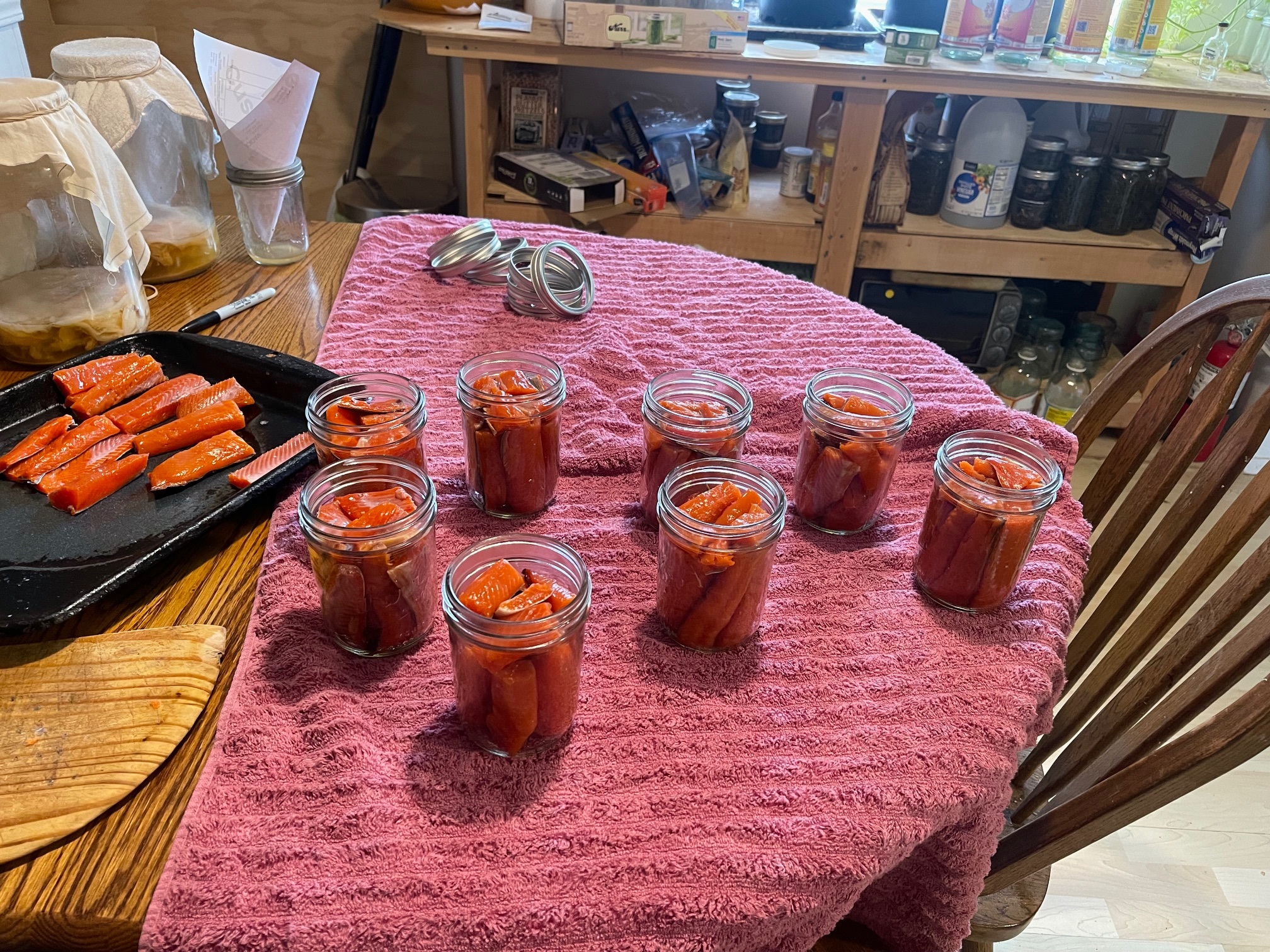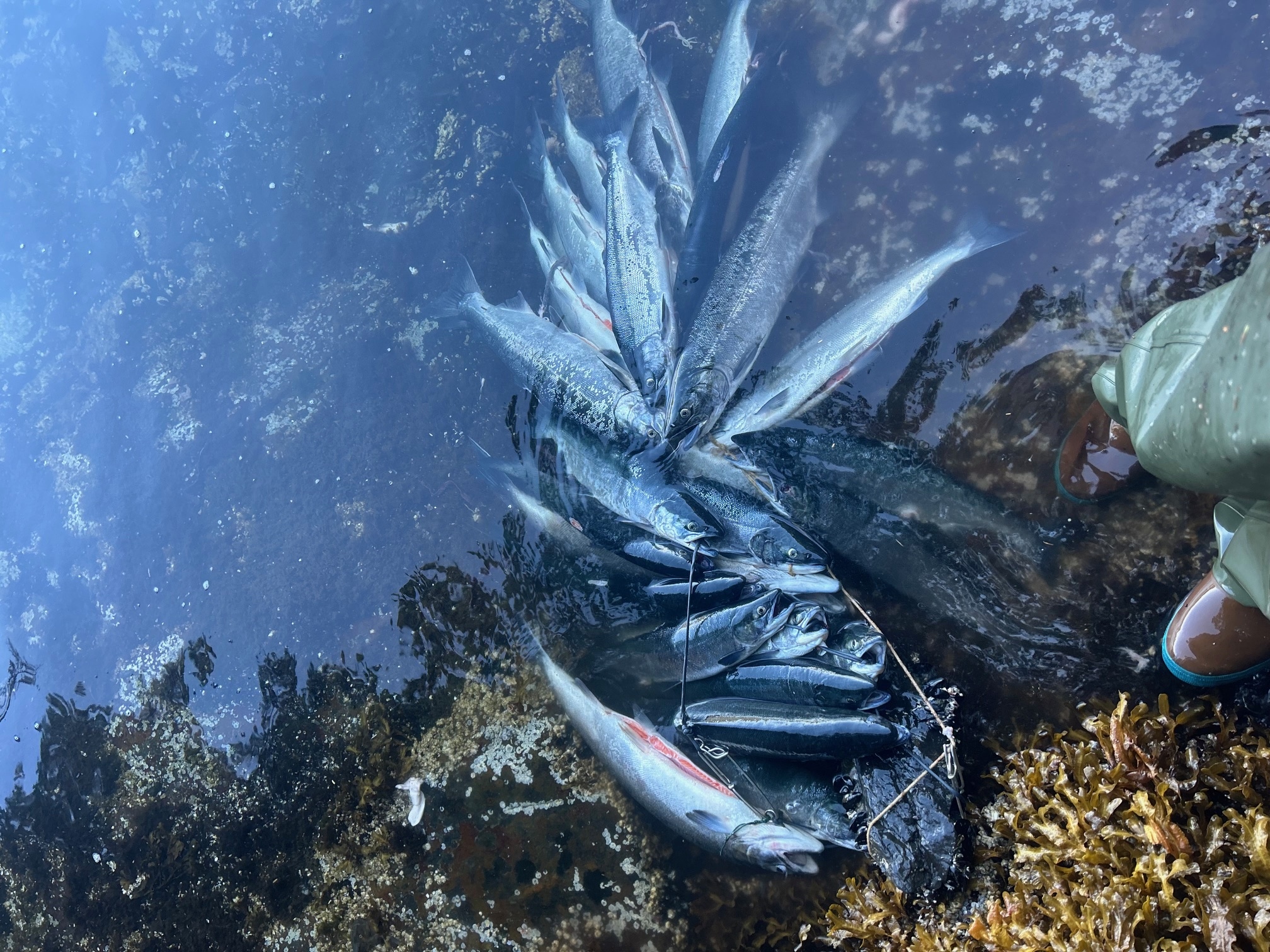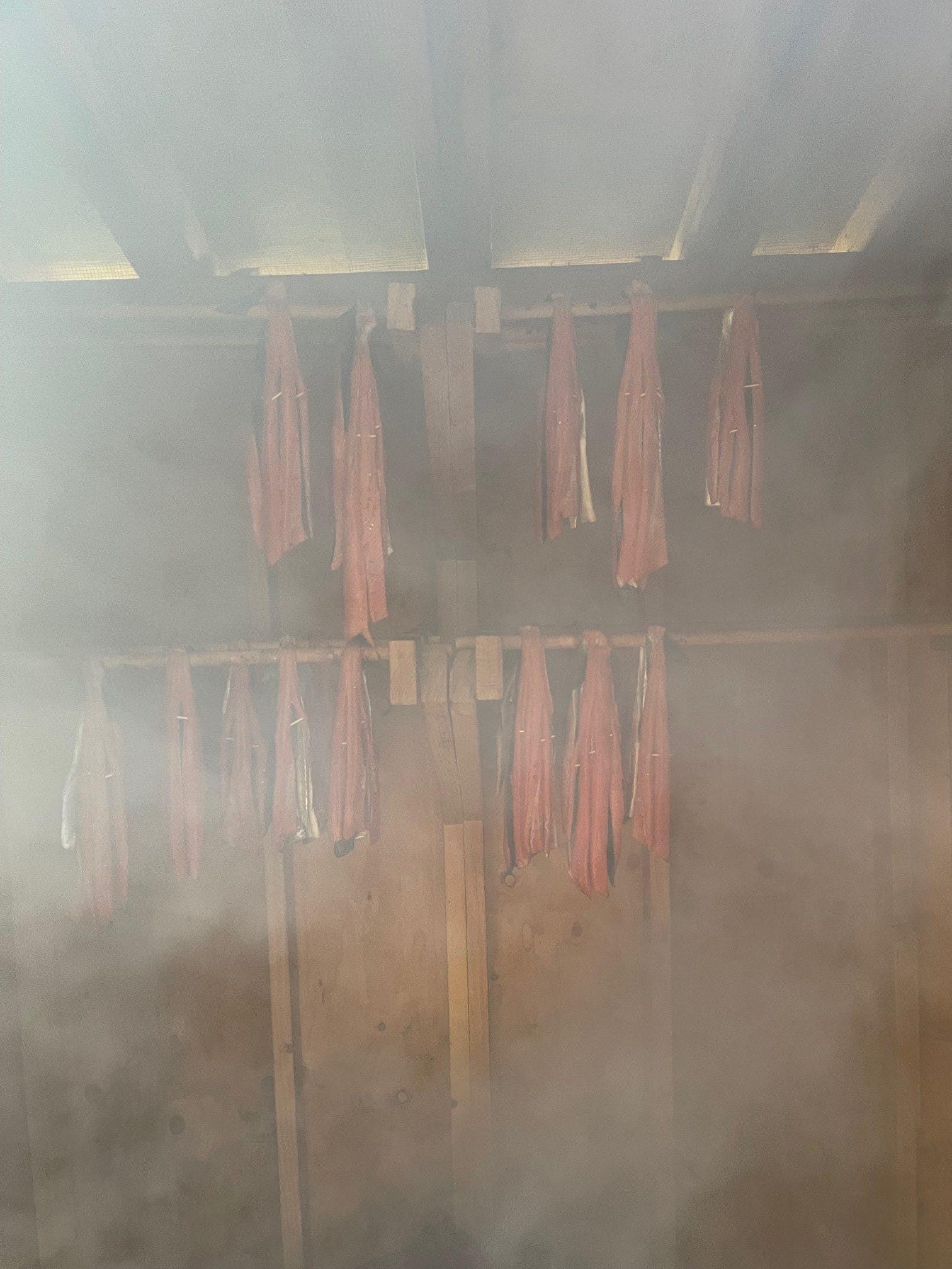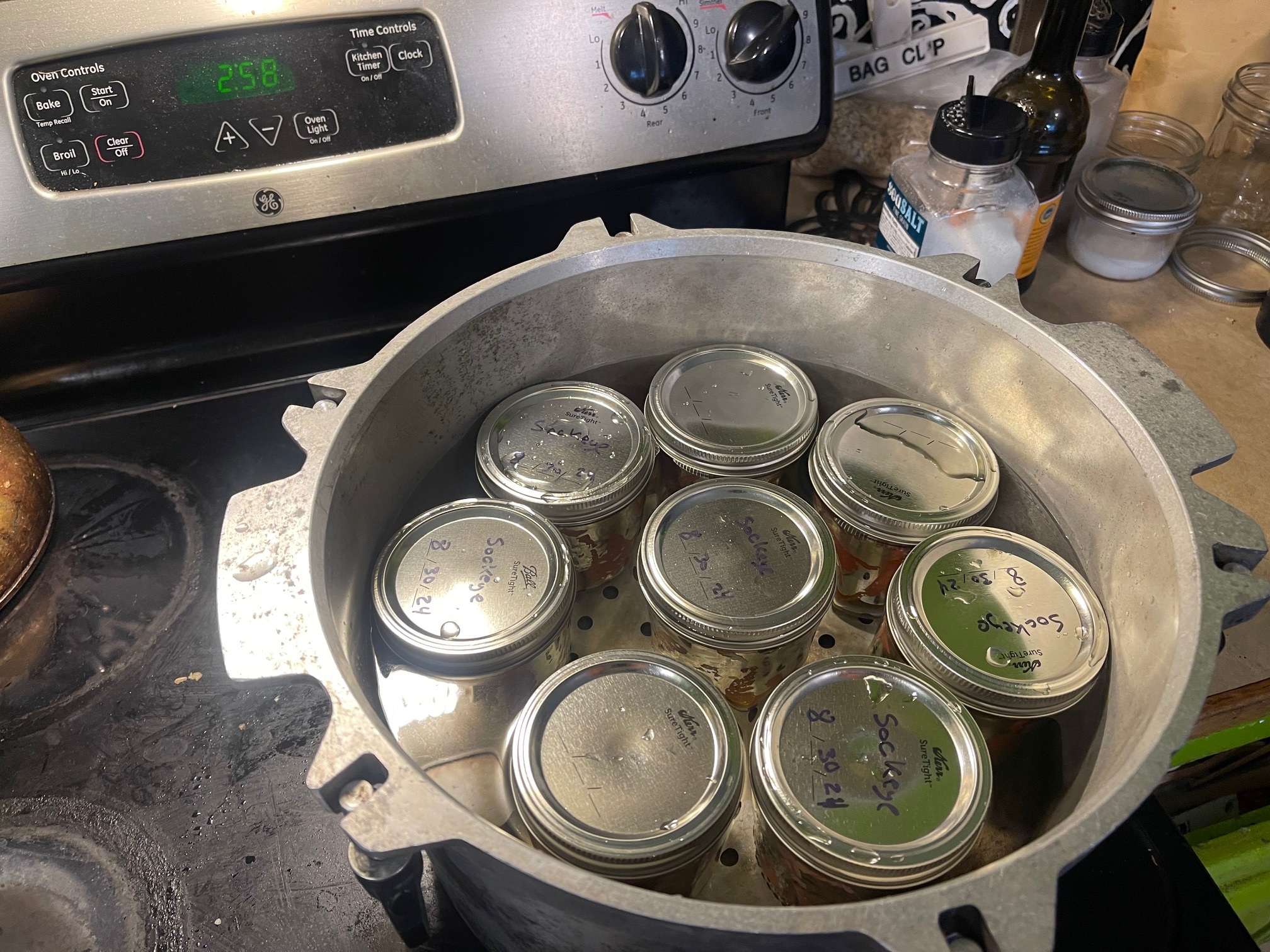Arriving late, breezing through the changing room door, I lock eyes with a regular sitting on a bench. As we catch up and I explain my frazzled energy, she asks with disappointment why I didn't bring any to share. “I just finished the batch and they are cooling off.” She gave me a stare as if I was making up excuses. “I just took them out 25 minutes ago. They were still bubbling when I left.” She replied with a hint of authority, “You’ll have to bring some next time.” Nodding in agreement, I flash a smile.
Inside the sauna, I sit next to the stove and bucket of water, often receiving mixed reviews as I frequently pour water on the hot rocks. Ed responds with a playful, deadpan, “Yup’ik heat.” Others say they are going to sit in my seat next time. I speak nervously about how my first solo batch of canning went, worried that I didn't cook them long enough and under the correct pressure. The grounding presence of the Elders, rooted in a lifetime of experiences and wisdom, reassures me that everything will be okay. They say I just need to tap on the top of the lids and listen to ensure it is sealed properly. Tom sits, leaning to one side, demonstrating as if drumming with lengthy arms and hands conducting a symphony, and says, “Tink, tink, tonk!” Ed and I turn towards each other as we chuckle. With a scrunched forehead and a grin, he looks at me and asks, “Did you get that part?” I say, “Yes, I got the tonk part down.” Ed replies, “Good. That’s the one you eat for dinner or put in the fridge.”
The next day, the internet and cell phones were still not working, reflecting on my first batch's struggle to maintain the proper pounds of pressure and how the water evaporated quickly—with steam fleeing from the sides of the lid. I examine the clamp bolts that gave me sass, scrubbing ashy clumps of corroded gunk off the threads and rubbing olive oil on them. The glossy plastic handles now clamp smoothly down. Solving the previous issues. My home’s atmosphere is weighted by the humidity of three batches of canning. Foggy windows mirror the grey low-hanging clouds outside, swirling together in the obscure haze of being unable to call, text, or use the internet—unplugged from the rest of the world. Also, free from the relentless pressure of constant instant availability, I have been basking in peaceful isolation.
It has taken me a few days to get the drift that the public is using satellite internet at the city office to contact loved ones and conduct business. The Central Council of the Tlingit and Haida Indian Tribes of Alaska (the regional Tribal government for Southeast Alaska) loaned additional dishes to vital places in town, including the library, creating a patchwork of wireless internet around town. I have meant to check it out and am unsure why no one has called to tell me sooner. Something in the air feels different as I pedal down to the library, passing the calmness of trees stretching gracefully toward the sky.
I interweave with the morning traffic of metal cages transporting people to larger ones. The modern architecture of the remodeled library looks like a cracked open book resting on milk cartons. Its muted colors and large windows are closed. But the wireless signal permeates out onto the scattered crowd on cold cement benches and idling cars. An increasing number of older White folks in town who have known me for most of my life do not recognize me anymore. Even when I wave, so I stop trying and sit down quietly next to a couple who are friends of my family who bought my artwork that hangs on their wall—scrolling through my phone for the first time in what feels like months, overhearing them gossip about who and how many people have shown up to use the internet. Pigeons and tourists flutter through downtown.
In front of the dark, haunting windows and locked doors of the bank, I wonder how to pay for food and other essentials besides checks and cash, and more importantly, how can we make a run on the bank if it is closed? My bike wheels glide to the brightly lit grocery store. Inside the visceral warmth, grabbing a few items, the strangers standing in line do not feel distant. Word on the street is that for businesses with internet from the other provider in town, it trickles through their phone line enough to process cards.
A quick electronic tone beeps as the cashier scans the geometric shapes of packaged food. Although I have interacted with her numerous times before, I have never seen or felt her presence in this way. Recently, my interactions with people have been more patient, open, and fulfilling. It is as if some crusty layer that dims our light has been removed, and the divine essence of a living being now shines through, allowing it to be felt, exchanged, and celebrated.
Studies have shown that human empathy decreases with our use of electronic devices, a truth we all witness yet choose not to recognize. As the darkest parts of humanity fester in an avatar of anonymity, school kids bully their peers to the point where digital existence becomes so painful they take their own lives to escape. Two in the morning at the dawn of summer, a swarm of neon green aphids takes flight next to a salmon stream. They look like tiny, plump fairies.
In the void of that precious soul, online ridicule persists in step with a global trend among adults where the authoritarianism of tech and its disconnection with reality blur the lines of what is sincere and what is not. Provide escapism from our responsibility with the tangible into almost all aspects of society—results of an extractive economic platform disguised as community.
Somewhere, tears streak down someone's face as they cry in agony. Someone else tenderly holds space for them as the energy in the room shifts. A bee awkwardly hovers in front of the soft pink of a salmonberry flower. Next to glowing screens, computer chips, and wires, the sickness is packaged as the medicine for what we all crave: connection and belonging. The smooth curvature of a salmon’s back breaks the surface as it jumps the falls.
Although I let my friends from out of town know that I cannot receive cellular data, they still try to send me photos and voice messages because of how integrated we have become with technology. Even when someone tells you it no longer works, we are so dependent that we cannot imagine it not working until suddenly it no longer does. A dying salmon lying in the shallows flicks its tail in defiance as a seagull approaches its eyeball.
If I need medical care, how will I get to the hospital, as I can no longer call 911? I plan to stumble out of my house, knock on my neighbor’s door, and hope they are home and willing to give me a ride. A bear silently strolls in neighborhood shadows, carrying the forest floor in its matted fur towards a trash can careless people have left out. A thwack of a massive paw knocks the container over. Lights flicker on. Voices shout. It scampers off into the dark.




